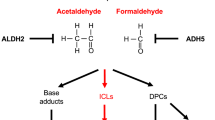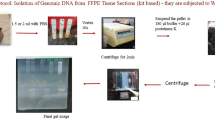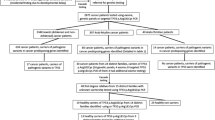Abstract
Colorectal cancer (CRC) is a complex and multifactorial disease, in which genetic and environmental factors both seem to play a part. Many epidemiological studies have explored the association between genetic polymorphisms of X-ray repair cross-complementing group 3 (XRCC3) (Thr241Met) and Xeroderma pigmentosum group D (XPD) lysine to glutamine at codon 751 (Lys751Gln) and risk of CRC in various populations; however, the results are controversial. We conducted this case–control study in a West Algerian population to assess the potential role of this genetic polymorphism on the risk of CRC in this population. Genomic DNA was extracted from blood samples collected from 129 sporadic CRC patients and 148 normal controls. The polymorphisms were determined by pyrosequencing technique. The distribution of XRCC3 Thr241Met and XPD Lys751Gln genotypes among controls did not differ significantly from those predicted by the Hardy–Weinberg distribution (p > 0.05). There were no significant differences in the genotypes distribution and allele frequencies between CRC patients and controls. A significant association was found between the combined heterozygous of XRCC3 and homozygous variant of XPD gene and CRC. This is the first study on DNA repair genetic polymorphisms in West Algerian population, and it suggests that the XRCC3 Thr241Met and XPD Lys751Gln polymorphisms may not be associated with the CRC risk in this population.
Similar content being viewed by others
References
Ferlay J, Shin HR, Bray F, Forman D, Mathers C and Parkin DM. GLOBOCAN 2008 v2.0, Cancer Incidence and Mortality Worldwide: IARC CancerBase No. 10 Internet.Lyon, France: International Agency for Research on Cancer; 2010. Available from: http://globocan.iarc.fr, accessed on 22/07/2013.
Center MM, Jemal A, Smith RA, Ward E. Worldwide variations in colorectal cancer. CA Cancer J Clin. 2009;59(6):366–78.
Meddah D, Meddah B, Touil AT, Ghalek M, Sahraoui T. Étude épidémiologique du cancer du côlon chez des patients de l’Ouest algérien. J Afr du Cancer/Afr J Cancer. 2009;1(1):31–5.
Gertig DM, Hunter DJ. Genes and environment in the etiology of colorectal cancer. Semin Cancer Biol. 1998;8(4):285–98.
Potter JD. Colorectal cancer: molecules and populations. J Natl Cancer Inst. 1999;91(11):916–32.
de Jong MM, Nolte IM, te Meerman GJ, van der Graaf WT, de Vries EG, Sijmons RH, et al. Low-penetrance genes and their involvement in colorectal cancer susceptibility. Cancer Epidemiol Biomark Prev. 2002;11(11):1332–52.
Wood RD, Mitchell M, Lindahl T. Human DNA repair genes. Mutat Res/Fundam Mol Mech Mutagen. 2005;577(1–2):275–83.
Hlavin EM, Smeaton MB, Noronha AM, Wilds CJ, Miller PS. Cross-link structure affects replication-independent DNA interstrand cross-link repair in mammalian cells. Biochemistry. 2010;49(18):3977–88.
Liu N, Lamerdin JE, Tebbs RS, Schild D, Tucker JD, Shen MR, et al. XRCC2 and XRCC3, new human Rad51-family members, promote chromosome stability and protect against DNA cross-links and other damages. Mol Cell. 1998;1(6):783–93.
Brenneman MA, Weiss AE, Nickoloff JA, Chen DJ. XRCC3 is required for efficient repair of chromosome breaks by homologous recombination. Mutat Res/DNA Repair. 2000;459(2):89–97.
Shen MR, Jones IM, Mohrenweiser H. Nonconservative amino acid substitution variants exist at polymorphic frequency in DNA repair genes in healthy humans. Cancer Res. 1998;58(4):604–8.
Matullo G, Guarrera S, Sacerdote C, Polidoro S, Davico L, Gamberini S, et al. Polymorphisms/haplotypes in DNA repair genes and smoking: a bladder cancer case–control study. Cancer Epidemiol Biomark Prev. 2005;14(11):2569–78.
Winsey SL, Haldar NA, Marsh HP, Bunce M, Marshall SE, Harris AL, et al. A variant within the DNA repair gene XRCC3 is associated with the development of melanoma skin cancer. Cancer Res. 2000;60(20):5612–6.
Kuschel B, Auranen A, McBride S, Novik KL, Antoniou A, Lipscombe JM, et al. Variants in DNA double-strand break repair genes and breast cancer susceptibility. Hum Mol Genet. 2002;11(12):1399–407.
Improta G, Sgambato A, Bianchino G, Zupa A, Grieco V, La Torre G, et al. Polymorphisms of the DNA repair genes XRCC1 and XRCC3 and risk of lung and colorectal cancer: a case–control study in a Southern Italian population. Anticancer Res. 2008;28(5B):2941–6.
Sung P, Bailly V, Weber C, Thompson LH, Prakash L, Prakash S. Human xeroderma-pigmentosum group-D gene encodes a DNA helicase. Nature. 1993;365(6449):852–5.
Lehmann AR. The xeroderma pigmentosum group D (XPD) gene: one gene, two functions, three diseases. Genes Dev. 2001;15(1):15–23.
Benhamou S, Sarasin A. ERCC2/XPD gene polymorphisms and cancer risk. Mutagenesis. 2002;17(6):463–9.
Benhamou S, Sarasin A. ERCC2 /XPD gene polymorphisms and lung cancer: a HuGE review. Am J Epidemiol. 2005;161(1):1–14.
Jiang Z, Li C, Xu Y, Cai S, Wang X. Associations between XPD polymorphisms and risk of breast cancer: a meta-analysis. Breast Cancer Res Treat. 2010;123(1):203–12.
Skjelbred CF, Saebø M, Wallin H, Nexø BA, Hagen PC, Lothe IM, et al. Polymorphisms of the XRCC1, XRCC3 and XPD genes and risk of colorectal adenoma and carcinoma, in a Norwegian cohort: a case control study. BMC Cancer. 2006;6(1):67.
Miller SA, Dykes DD, Polesky HF. A simple salting out procedure for extracting DNA from human nucleated cells. Nucleic Acids Res. 1988;16(3):1215.
Khanna KK, Jackson SP. DNA double-strand breaks: signaling, repair and the cancer connection. Nat Genet. 2001;27(3):8.
Griffin CS. Aneuploidy, centrosome activity and chromosome instability in cells deficient in homologous recombination repair. Mutat Res/Fundam Mol Mech Mutagen. 2002;504(1–2):149–55.
Matullo G, Palli D, Peluso M, Guarrera S, Carturan S, Celentano E, et al. XRCC1, XRCC3, XPD gene polymorphisms, smoking and 32P-DNA adducts in a sample of healthy subjects. Carcinogenesis. 2001;22(9):1437–45.
Al-Hadyan KS, Al-Harbi NM, Al-Qahtani SS, Alsbeih GA. Involvement of single-nucleotide polymorphisms in predisposition to head and neck cancer in Saudi Arabia. Genet Test Mol Biomark. 2012;16(2):95–101.
López-Cima MF, González-Arriaga P, García-Castro L, Pascual T, Marrón MG, Puente XS, et al. Polymorphisms in XPC, XPD, XRCC1, and XRCC3 DNA repair genes and lung cancer risk in a population of Northern Spain. BMC Cancer. 2007;7:162.
Curtin K, Samowitz WS, Wolff RK, Ulrich CM, Caan BJ, Potter JD, et al. Assessing tumor mutations to gain insight into base excision repair sequence polymorphisms and smoking in colon cancer. Cancer Epidemiol Biomark Prev. 2009;18(12):3384–8.
Krupa R, Sliwinski T, Wisniewska-Jarosinska M, Chojnacki J, Wasylecka M, Dziki L, et al. Polymorphisms in RAD51, XRCC2 and XRCC3 genes of the homologous recombination repair in colorectal cancer—a case control study. Mol Biol Rep. 2011;38(4):2849–54.
Curwen GB, Murphy S, Tawn EJ, Winther JF, Boice JD Jr. A study of DNA damage recognition and repair gene polymorphisms in relation to cancer predisposition and G2 chromosomal radiosensitivity. Environ Mol Mutagen. 2011;52(1):72–6.
Wang J, Zhao Y, Jiang J, Gajalakshmi V, Kuriki K, Nakamura S, et al. Polymorphisms in DNA repair genes XRCC1, XRCC3 and XPD, and colorectal cancer risk: a case–control study in an Indian population. J Cancer Res Clin Oncol. 2010;136(10):1517–25.
Yeh CC, Sung FC, Tang R, Chang-Chieh CR, Hsieh LL. Polymorphisms of the XRCC1, XRCC3, & XPD genes, and colorectal cancer risk: a case–control study in Taiwan. BMC Cancer. 2005;5:12.
Settheetham-Ishida W, Yuenyao P, Natphopsuk S, Settheetham D, Ishida T. Genetic risk of DNA repair gene polymorphisms (XRCC1 and XRCC3) for high risk human papillomavirus negative cervical cancer in Northeast Thailand. Asian Pac J Cancer Prev. 2011;12(4):963–6.
Zhao Y, Deng X, Wang Z, Wang Q, Liu Y. Genetic polymorphisms of DNA repair genes XRCC1 and XRCC3 and risk of colorectal cancer in Chinese population. Asian Pac J Cancer Prev. 2012;13(2):665–9.
Ben Salah G, Fendri-Kriaa N, Kamoun H, Kallabi F, Mekaouar-Rebai E, Fourati A et al. An interethnic variability and a functional prediction of DNA repair gene polymorphisms: the example of XRCC3 (p.Thr241 > Met) and XPD (p.Lys751 > Gln) in a healthy Tunisian population. Mol Biol Rep. 2012; 39(10):9639–9647.
Mort R, Mo L, McEwan C, Melton DW. Lack of involvement of nucleotide excision repair gene polymorphisms in colorectal cancer. Br J Cancer. 2003;89(2):333–7.
Canbay E, Agachan B, Gulluoglu M, Isbir T, Balik E, Yamaner S, et al. Possible associations of APE1 polymorphism with susceptibility and HOGG1 polymorphism with prognosis in gastric cancer. Anticancer Res. 2010;30(4):1359–64.
Benhamou S, Tuimala J, Bouchardy C, Dayer P, Sarasin A, Hirvonen A. DNA repair gene XRCC2 and XRCC3 polymorphisms and susceptibility to cancers of the upper aerodigestive tract. Int J Cancer. 2004;112(5):901–4.
Wang Z, Zhang W. Association between XRCC3 Thr241Met polymorphism and colorectal cancer risk. Tumor Biol. 2013;34(3):1421–9.
Wang XW, Vermeulen W, Coursen JD, Gibson M, Lupold SE, Forrester K, et al. The XPB and XPD DNA helicases are components of the p53-mediated apoptosis pathway. Genes Dev. 1996;10(10):1219–32.
Coin F, Bergmann E, Tremeau-Bravard A, Egly JM. Mutations in XPB and XPD helicases found in xeroderma pigmentosum patients impair the transcription function of TFIIH. EMBO J. 1999;18(5):1357–66.
Moisan F, Laroche-clary A, Auzanneau C, Ricard N, Pourquier P, Robert J, et al. Deciphering the role of the ERCC2 gene polymorphism on anticancer drug sensitivity. Carcinogenesis. 2012;33(5):962–8.
Moreno V, Landi S, Gioia-Patricola L, Chabrier A, Blanco I, González S et al. Polymorphisms in genes of nucleotide and base excision repair: risk and prognosis of colorectal cancer. Clin Cancer Res. 2006; 12(7Pt1):2101–2108.
Huang WY, Berndt SI, Kang D, Chatterjee N, Chanock SJ, Yeager M, et al. Nucleotide excision repair gene polymorphisms and risk of advanced colorectal adenoma: XPC polymorphisms modify smoking-related risk. Cancer Epidemiol Biomark Prev. 2006;15(2):306–11.
Joshi AD, Corral R, Siegmund KD, Haile RW, Marcha,d LL, Martinez ME et al. Red meat and poultry intake, polymorphisms in the nucleotide excision repair and mismatch repair pathways and colorectal cancer risk. Carcinogenesis. 2009; 30(3):472–479.
Zhang Y, Ding D, Wang X, Zhu Z, Huang M, He X. Lack of association between XPD Lys751Gln and Asp312Asn polymorphisms and colorectal cancer risk: a meta-analysis of case–control studies. Int J Colorectal Dis. 2011;26(10):1257–64.
Bigler J, Ulrich CM, Kawashima T, Whitton J, Potter JD. DNA repair polymorphisms and risk of colorectal adenomatous or hyperplastic polyps. Cancer Epidemiol Biomark Prev. 2005;14(11):2501–8.
Lamas MJ, Duran G, Balboa E, Bernardez B, Touris M, Vidal Y, et al. Use of a comprehensive panel of biomarkers to predict response to a fluorouracil–oxaliplatin regimen in patients with metastatic colorectal cancer. Pharmacogenomics. 2011;12(3):433–42.
Lai JI, Tzeng CH, Chen PM, Lin JK, Lin TC, Chen WS, et al. Very low prevalence of XPD K751Q polymorphism and its association with XPD expression and outcomes of FOLFOX-4 treatment in Asian patients with colorectal carcinoma. Cancer Sci. 2009;100(7):1261–6.
Le Morvan V, Smith D, Laurand A, Brouste V, Bellot R, Soubeyran I, et al. Determination of ERCC2 Lys751Gln and GSTP1 Ile105Val gene polymorphisms in colorectal cancer patients: relationships with tratment outcome. Pharmacogenomics. 2007;8(12):1693–703.
Rezaei H, Motovali-bashi M, Khodadad K, Elahi A, Emami H, Naddaffnia H. Relationship between XPD Lys 751 Gln polymorphism and colorectal cancer risk: a case–control study in a population-based study. Gastroenterol Hepatol Bed Bench. 2013;6(1):18–24.
Hansen RD, Sørensen M, Tjønneland A, Overvad K, Wallin H, Raaschou-Nielson O, et al. XPA A23G, XPC Lys939Gln, XPD Lys751Gln and XPD Asp312Asn polymorphisms, interactions with smoking, alcohol and dietary factors, and risk of colorectal cancer. Mutat Res. 2007;619(1–2):68–80.
Jelonek K, Gdowicz-Kłosok A, Pietrowska M, Borkowska M, Korfanty J, Rzeszowska-Wolny J, et al. Association between single-nucleotide polymorphisms of selected genes involved in the response to DNA damage and risk of colon, head and neck, and breast cancers in a Polish population. J Appl Genet. 2010;51(3):343–52.
Engin AB, Karahalil B, Engin A, Karakaya AE. Oxidative stress, Helicobacter pylori, and OGG1 Ser326Cys, XPC Lys939Gln, and XPD Lys751Gln polymorphisms in a Turkish population with colorectal carcinoma. Genet Test Mol Biomark. 2010;14(4):559–64.
Ouyang FD, Yang FL, Chen HC, Asaduzzaman Khan M, Huang FM, Wan XX et al. Polymorphisms of DNA repair genes XPD, XRCC1, and OGG1, and lung adenocarcinoma susceptibility in Chinese population. Tumor Biology. 2013; 34(5):2834–2848.
Park JY, Lee SY, Jeon HS, Park SH, Bae NC, Lee EB, et al. Lys751Gln polymorphism in the DNA repair gene XPD and risk of primary lung cancer. Lung Cancer. 2002;36(1):15–6.
Acknowledgments
The authors of this article are grateful to all subjects for donating their blood for this study. In addition, they thank all the collaborators for collection of blood samples and information.
Conflict of interests
The authors have declared that no conflict of interests exists.
Author information
Authors and Affiliations
Corresponding author
Rights and permissions
About this article
Cite this article
Moghtit, F.Z., Aberkane, M.S., Le Morvan, V. et al. No association between XRCC3 Thr241Met and XPD Lys751Gln polymorphisms and the risk of colorectal cancer in West Algerian population: a case–control study. Med Oncol 31, 942 (2014). https://doi.org/10.1007/s12032-014-0942-3
Received:
Accepted:
Published:
DOI: https://doi.org/10.1007/s12032-014-0942-3




